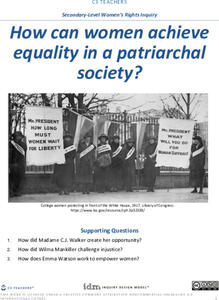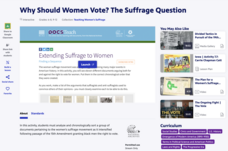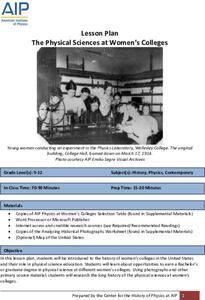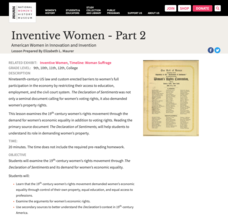Library of Congress
Women's Suffrage Movement Across America
An engaging resource provides many primary source materials to inform a study of the Women's Suffrage Movement. Suggestions include building a timeline of the fight, using the documents as the basis of a DBQ, and/or using a Venn diagram...
NPR
Chinese American Women Lesson Plan
The National Women's History Museum provides a plan designed to accompany their online CyberExhibit, Chinese American Women; a History of Resilience and Resistance. After examining a series of primary and secondary source documents,...
City University of New York
Women's Suffrage and World War I
Democracy cannot exist where not everyone has equal rights. Discuss the state of democracy and women's suffrage during World War I with class discussions, debates, and primary source analysis, in order for class members to connect with...
Curated OER
Examining Women's Roles through Primary Sources and Literature
Pupils interpret historical evidence presented in primary resources. In this women's history activity, students examine the role of women prior to and following the suffrage movement. Pupils also read selected pieces of women's literature.
Curated OER
Women's History Quiz
Explore the contributions that women have made throughout American history. Here are 10 questions that take learners through time, stopping to recognize various accomplishments women have made along the way. The online worksheet includes...
Curated OER
Finding the Main Idea: Little Women
Whether or not your class is reading Louisa May Alcott’s Little Women, you can use this exercise as the basis of a mini-lesson on how to determine the main idea of a passage or as a pre-test to assess mastery of the skill. A graphic...
Curated OER
Women's Lives in American Paintings
Students analyze paintings to determine characteristics of women and attitudes toward them in different time periods. They create a portrait of a woman and discuss their views of women through their own artwork.
C3 Teachers
Women’s Rights: How Can Women Achieve Equality in a Patriarchal Society?
Women today may not have heard of Madame C.J. Walker or Wilma Mankiller, and a few may not be aware of Emma Watson's current role; however, they have certainly benefited from their efforts. Using questions supplied by this guided...
Collier County Public Schools
Women’s History Month Resource Packet
The women's suffrage movement changed the lives of future. Scholars complete hands-on activities, group discussions, posters, and conduct research to understand the importance of the push for women's right to vote. The resource packet...
C-SPAN
Women's Contributions in the Civil War
Women's history is often hidden, but pupils discover the role women played in the Civil War using a series of video clips. After reviewing the interview with a scholar of women's history, class members fill out a chart and then research...
PBS
Why Should Women Vote? The Suffrage Question
An online interactive activity asks learners to analyze a group of documents related to the women's suffrage movement and then place the documents on a timeline. The results assess users understanding of the progression of the women's...
C-SPAN
Women's Suffrage and the 19th Amendment
The right to vote was hard-won after decades of organizing by women and their allies. Using a series of video clips featuring women's historians, class members consider the efforts behind the Nineteenth Amendment. Possible extension...
US House of Representatives
The Women of Congress Speak Their Mind
A picture may be worth a thousand words, but words can tell many stories. To conclude their study of the women who have served in the US Congress until 2006, groups analyze statements made by these remarkable women.
C3 Teachers
Call for Change: What Did It Take for Women to Be Considered “Equal” to Men in New York?
An inquiry-based lesson challenges fourth graders to examine who had voting rights in New York when it was founded, women's roles, and how they entered politics. Scholars participate in thoughtful discussions and show what they know...
American Institute of Physics
The Physical Sciences at Women's Colleges
After a brief introduction to the history of women's colleges in the United States and a discussion of the resistance such institutions faced, young scientists investigate seven traditionally women's colleges and their physics programs....
National Woman's History Museum
Defying British Rule: Women's Contributions to The American Revolution
Primary and secondary sources are the focus of a lesson that showcases the important role women played during the American Revolution. Pairs review sources and discuss their findings. A close-reading of an informational text leads the...
Roy Rosenzweig Center for History and New Media
The Revolutionary Times as Seen Through the Eyes of Women
The role of women before and during the American Revolution changed dramatically. To gain an understanding of these changes, middle schoolers analyze primary source documents, including letters from women that supported the patriot cause...
National Woman's History Museum
The Supreme Court and the Lives of American Women 1908-2005
While Roe v. Wade and the passage of the Nineteenth Amendment often get top billing in women's history, other lesser-known laws impact their daily lives. Pupils research cases such as Planned Parenthood v. Casey and use a jigsaw model to...
American Institute of Physics
Women and the Manhattan Project
The Manhattan Project was a massive undertaking involving multiple sites and thousands of scientists and technicians. To gain an understanding of the women who participated in the project, groups select an oral history of a woman...
Teaching Women's History
Medieval Women
Not all the women in the late Middle Ages (1400-1510) lived lives of quiet desperation. Young historians study images and read primary source documents to gain an understanding of what life was like for the elite class of medieval women.
US House of Representatives
Recent Trends Among Women in Congress, 1977–2006
After reading the contextual essay, "Assembling, Amplifying, and Ascending: Recent Trends Among Women in Congress 1977–2006," groups select a female senator or representative and research her background and contributions.
National Woman's History Museum
Propaganda and Women's Suffrage
Americans who backed the suffragist movement used posters to gain the support of others for their cause. Class members analyze the visual imagery and propaganda devices used in a variety of these posters. In addition, groups examine how...
Curated OER
What We Learn From Women and Girls
Role models are all around us! Young learners celebrate Women's History Month by selecting two female role models in their lives, and writing or drawing a short description about why they admire that girl or woman.
National Woman's History Museum
Inventive Women - Part 2
The Declaration of Independence was published in 1776. The Declaration of Sentiments and Resolutions, modeled after the Declaration of Independence, was drafted and read by Elizabeth Cady Stanton at the Seneca Falls Convention in 1848....
Other popular searches
- History of Women
- Women History
- Women's Rights
- Womens Health
- Women's History
- Women's History Month
- History of American Women
- Working Women
- Women's Suffrage
- Famous Women
- Little Women
- Women in u.s. History

























